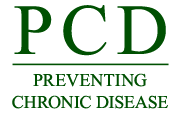PCD News Summary for March 26, 2020

Notice to News Media – PCD Release Time and Embargo Policy:
CDC’s News Media Branch releases to reporters the PCD media packet every Tuesday afternoon between 12 and 2 pm.
Embargoed until Thursday, March 26, at 12:00 PM ET
U.S. Adults’ Perceptions About the Harms of Nicotine in Electronic Vapor Products on the Adolescent Brain
About two-thirds of adults in the United States agree that nicotine in electronic vapor products (EVP) is harmful to the developing adolescent brain. Electronic vapor products, including e-cigarettes, have been the most commonly used tobacco products among U.S. middle and high school students since 2014. EVP typically contain nicotine, which is highly addictive and can harm the developing adolescent brain. Adults serve a critical role in preventing youth tobacco product use. Therefore, it is important to educate adults, particularly those who are influencers of youth, about the harmful effects of youth EVP use. CDC researchers assessed adults’ perceptions about the harms of nicotine in EVP to the adolescent brain by using data from cross-sectional internet surveys conducted in 2016 and 2017. Of respondents in 2016, 68.5% agreed exposure to nicotine in EVP was harmful, and of respondents in 2017, 62.6% agreed.
Joel London
Senior Press Officer
CDC, Office on Smoking and Health
770-488-5439
jlondon@cdc.gov
###
Note: Not all articles published in PCD represent work done at CDC. In your stories, please clarify whether a study was conducted by CDC (“a CDC study”) or by another institution (“a study published by CDC”). The opinions expressed by authors contributing to PCD do not necessarily reflect the opinions of CDC or the institutions with which the authors are affiliated. PCD requests that, when possible, you include a live link to the article in your stories.
###
U.S. DEPARTMENT OF HEALTH AND HUMAN SERVICES
CDC works 24/7 protecting America’s health, safety and security. Whether diseases start at home or abroad, are curable or preventable, chronic or acute, stem from human error or deliberate attack, CDC is committed to respond to America’s most pressing health challenges.
